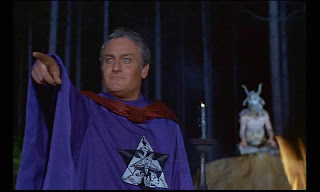I first saw this documentary about underground comics legend Robert Crumb in 1996, with my then-girlfriend. It is not a date movie. Crumb's comics are notorious for their misogyny and racist imagery, while at the same time he is regularly acclaimed as a genius. Although his surname is a common word, a Google image search on the word "crumb" brings up nothing but images relating to his comics. This is despite the fact that he has never been published by any of the "major" comic book companies, and has actually self-published much of his own work. He is a strange-looking guy (skinny and gawky with coke-bottle glasses and deliberately old-fashioned clothes) who is apparently very shy, but on film he has a real charisma. He's a mess of contradictions, and this movie is a fascinating portrait of his work, his family, and himself.
The movie takes you through quite a but of his comics work, some of which is very disturbing, and gives equal time to his defenders and his critics. It's interesting that Crumb does not actually defend himself; he says that he made a decision many years ago to never censor himself and to let all the most disturbing images in his head come out onto paper, and that his creative process is largely unconscious and he doesn't know where his stories are going until he draws them. He says that sometimes he thinks perhaps he should not be allowed to draw this stuff and that maybe he should be locked up and have his pencils taken away from him, but at the same time it seems clear that drawing his comics is what keeps him on an even keel.
We don't learn too much about how Robert Crumb ended up the way he is, apart from some references to his father being a domineering and violent tyrant, but the interviews with his brothers and his mother make it pretty clear that Robert is the most well-adjusted member of his family, at least among those who appear in the movie (his two sisters declined to be interviewed).
This is a top-notch documentary that is best watched when you are not already feeling depressed.

Peeping Tom (1960)
Set in the sordid milieu of under-the-counter pornography, this movie is about Mark, a young photographer who is making his own snuff movies. It has some interesting parallels with the same year's Psycho, directed by the expatriate British director Alfred Hitchcock in America. The main difference is that while Psycho solidified Hitchcock's position as the master of thrillers, Peeping Tom caused director Michael Powell's reputation to plummet; he had been at the very top of his profession to this point, but was subsequently unable to make any more movies in Britain and ended up settling in Australia.
Melodramatic in the extreme and rather dated, Peeping Tom still has a curious power. Mark is very open to the idea of being caught, and manages to get caught between falling for a young woman in his apartment building and feeling driven to complete his "work". I found the comic relief scenes tiresome, but they actually drew big laughs from the audience I saw it with so that must be a matter of personal taste.

The Abominable Dr. Phibes (1971)
Vincent Price stars as a crazed organist who is bringing the Ten Plagues of Egypt down on the surgeons he holds responsible for the death of his wife. He also talks through a gramophone horn connected by a tube to a hole in his neck. He has somehow convinced a beautiful silent woman to assist him in his murderous task.
As you can tell from the above plot description, this is the greatest movie ever made.










